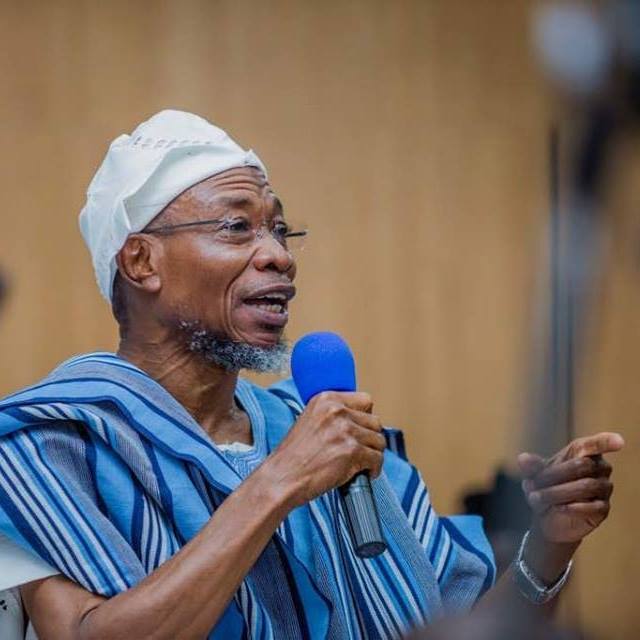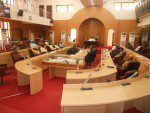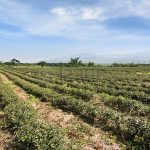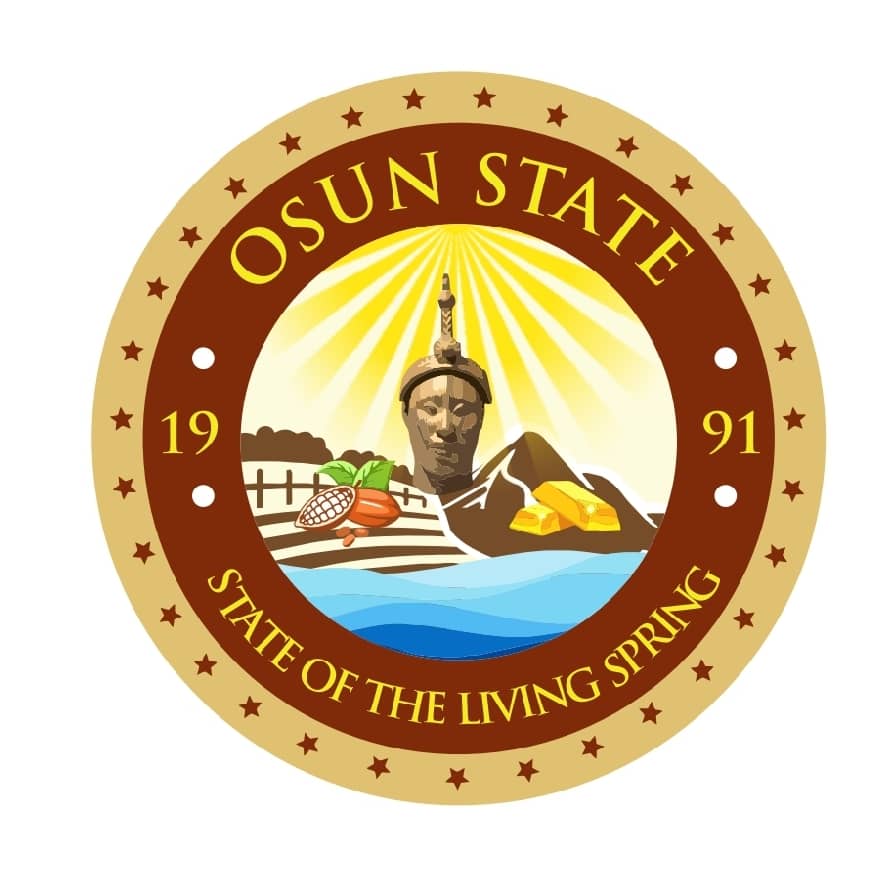PAPER PRESENTED BY OGBENI RAUF AREGBESOLA AT THE OFFICIAL LAUNCH OF GLOBAL AFFAIRS AND SUSTAINABLE DEVELOPMENT INSTITUTE (GASDI) OF OSUN STATE UNIVERSITY HELD AT THE UNIVERSITY CAMPUS ON TUESDAY JUNE 25, 2019
Protocols,
SUSTAINABLE DEVELOPMENT IN AN EMERGING STATE LIKE OSUN
I must thank the Global Affairs and Sustainable Development Institute (GASDI) of Osun State University for the kind invitation to its official launch. The last time I was here, it was in the official capacity as Visitor at the convocation ceremonies of the university. I thank you immensely therefore for considering me worthy of this distinguished assembly of scholars, administrators and students.
I must also congratulate you on the establishment of GASDI, an institute for the study of global affairs and sustainable development. It is a bold and ambitious step which will further entrench the university as a centre of excellence.
My first concern on all things educational is funding. To have a world class institute, you must have adequate funding to be able put in place excellent infrastructure and attract quality faculty in the relevant fields. I sincerely hope this has been well thought out and at the end of the day we shall have the institute of our dream.
The second is focus. I have seen many examples of how institutions derail in our clime. Many institutes were set up with lofty goals but along the line, they couldn’t get adequate funding. They have had to rely on existing faculties, instead of recruiting fresh ones. They then charge cut-throat tuition fees as the institutes soon turns out to be money spinning ventures for the university where students rush to because of the certificates issued at the end of the programme, with little or no research taking place at the end of the day. I pray that you avoid this pitfall.
I have been asked to talk about ‘Sustainable Development in an Emerging State: The State of Osun’. This subject is very relevant now and will continue to be so in a long time to come.
Sustainable development has been the buzzword in development circles since 1987 when the Brundtland Commission came out with its report. The commission was set up in 1983 by the then UN Secretary General, Javier Perez de Cuellar, to, among other things, 1, propose long-term environmental strategies for achieving sustainable development to the year 2000 and beyond, 2, recommend ways in which concern for the environment may be translated into greater co-operation among developing countries and between countries at different stages of economic and social development and lead to the achievement of common and mutually supportive objectives which take account of the interrelationships between people, resources, environment and development.
The Brundtland Report warned of the negative environmental consequences of economic growth and globalization, which tried to find possible solutions to the problems caused by industrialization and population growth.
Concern for the environment had heightened for reason of the rise in human population and the efforts to meet human needs. This will come to bold relief if we consider that according to the UN, human population by 300 AD was just above 300 million but is now 7.7 billion and is projected to rise to 9.8 billion in 2050. This rise from 300 million to 7.7 billion has grave implications for the earth in terms of food, housing, clothing and energy demands, among others.
For instance, if we are to provide a three bedroom apartment for a family of four on a 600 square metres of land, the entire farmland in Osun would be swallowed and may not even be sufficient. Again, in the absence of kerosene, gas and electric power, the entire woods in the forest may be used up for making fire in one or two years, thereby eliminating the carbon sink and putting the human race in jeopardy of extinction.
Already, the pressure on land has generated conflicts and cycles of intractable violence in Nigeria and many parts of Africa. There are other consequences of the challenges of growing human population in climate change, growing poverty and inequality and the attendant conflicts in human society.
This is why concern has risen and efforts are being made to arouse consciousness on putting in place a global development system that satisfies the needs of the present without compromising the capacity of future generations, guaranteeing the balance between economic growth, care for the environment and social well-being. This is what sustainable development is all about.
The UN has provided clear leadership on this. It came up with 17 Sustainable Development Goals that if we all work towards, will indeed bring the objectives to fruition.
These are:-
Permit me to enter two caveats here. One, we must be conscious of the dichotomy between developing and developed world on the path to development. This begins with the history of slavery and colonialism lasting for more than 400 years in which the human and material resources of the developing world are cruelly taken away for the benefit of Euro-America countries, leaving Africa and Nigeria in particular, despoiled, underdeveloped and ravaged, deepening their misery and dependency.
The second, flowing from the first, is the ease with which the developed world, luxuriating in the heist of slavery and colonialism, was able to kick-start the Industrial Revolution and the development that followed and how they have been trying to remove the ladder through which they climbed up, making it inaccessible to the developing countries who have now been reduced to providers of raw materials and consumers of finished, substandard and even second hand products.
We must be conscious of all these and bring them to bear on our research and scholarship. We should also develop home-grownsolutions in the quest to develop alternatives and arrive at the development goals.
I was privileged to lead a team that administered Osun in two democratic terms totalling eight years. We were conscious of sustainable development and factored this into every aspect of governance. We campaigned to implement a six point integral action plan. These are:
Banish Hunger
Banish Poverty
Banish Unemployment
Promote Healthy Living
Promote Functional Education
Promote Communal Peace and Progress
These will look like they were extracted from the UN 17 Sustainable Development Goals. We followed them closely.
Osun is primarily an agrarian state. Our development objectives were therefore built around agriculture. Our projection was to work with other states in our region to be able to provide the food needs of the South West, particularly Lagos. We sent two batches of youths to Germany for training in animal husbandry and advanced farming techniques. We established an agriculture training academy. We provided more than N15 billion soft loans to farmers. We also provided farming inputs and other assistance to farmers through agencies like Osun Rural Enterprise and Agriculture Programme (OREAP), Quip Impact Intervention Programme (QIIP) and others.
We integrated our agriculture programme with the Home Grown School Feeding and Health Programme (OMEALS). Through this scheme, we empowered small holding poultry farmers under OBOPS I and OBOPS II to produce chickens which are then bought off them and included in the daily free meals supplied to elementary school pupils every school day. We developed similar programmes for catfish.
A fundamental principle we tried to entrench all through our tenure was productivity. This is central to sustainable development. We discovered that in our agriculture practice in particular, productivity is low. We noted with dismay that while Nigeria and much of Africa are leading producers of cassava for instance, the traditional yield per hectare has been around 10 tonnes while global average in 2010 was put at 12.5 tonnes. However, India’s average yield in 2010 was 34.8 tonnes per hectares and Thailand’s yield is reported to be a whopping 120 tonnes per hectare. If we can increase productivity, we will cultivate less land and still have more food, thereby reducing the pressure on land.
A major target of our administration was to eliminate poverty and create wealth. In our first 100 days, we launched an empowerment scheme through which 20,000 youths were engaged in public service in the state. This we did three times during our tenure, making a total of 60,000 youths employed by our administration. This programme was so successful that it was copied by the Federal Government and the World Bank. Under our watch, Osun hosted other states of the federation twice to put them through on how to gainfully engage the youth.
These programmes impacted the state so well such that Osun, according to National Bureau of Statistics (NBS), recorded the least unemployment rate in Nigeria, starting from 2013, for many years running. Because of the successful youth engagement programmes, it recorded the least crime rate also.
In addition, in 2015, The Oxford Poverty and Human Development Initiative (OPHI) rated Osun 2nd Highest in Human Development Index among the 36 states in the country. In 2014, Renaissance Capital (RENCAP) in its 36 shades of Nigeria economic review of states ranked Osun as the 7th largest economy in Nigeria.
This is our legacy which our successor has been building on. He will surely take it to the next level.
Sustainable development is doable, though not without serious challenges. It will take changing the way we look at things, the way we think and the way we do things in the past. It will also take new legislations and strong government Will to lead and take the hard road.
It will take original thinking by our academics and researchers. We will not get there by merely regurgitating passed-on ideas from the developed world that were designed to suit their own environment and keep us dependent. It is my firm belief that we shall get there.
I thank you once again for inviting me and wish you a successful conference.
I thank you all for your kind attention.











